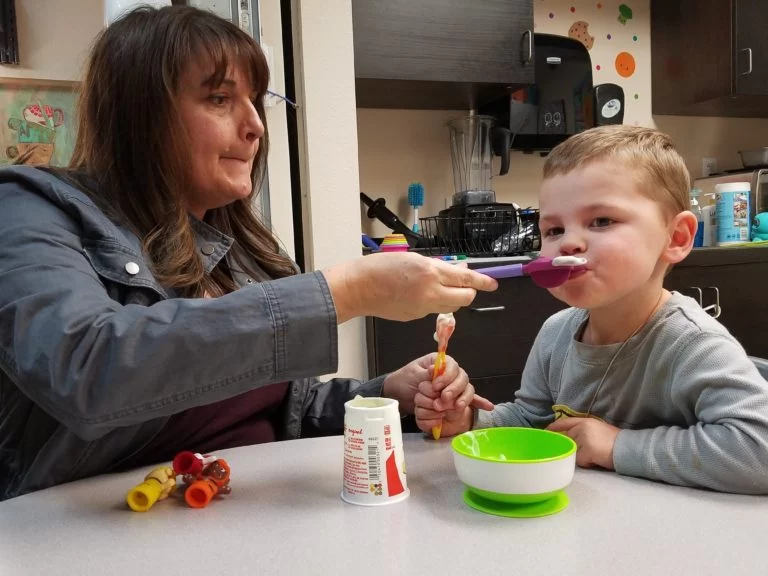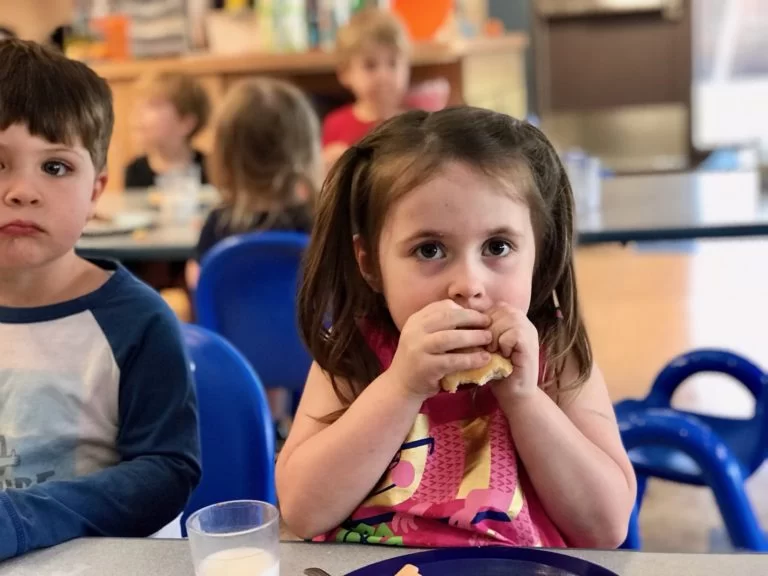
No más comedores quisquillosos
Hasta que me convertí en terapeuta de alimentación, comer era algo que siempre daba por sentado. Siempre me ha gustado comer. De hecho, me considero un poco entusiasta. Claro, tuve algunas de esas veces cuando era niño cuando tuve que sentarme en la mesa hasta que terminé lo que estaba en mi plato. Creo que el récord fue un enfrentamiento de cuatro horas porque odiaba el estofado de carne que hizo mi madre. A casi todos a mi alrededor también les gustaba comer, excepto mi primo, que básicamente solo comía hamburguesas hasta que tenía unos 18 años. Pero él era un jugador de fútbol próspero, así que a nadie le preocupaba.
As I began my work as a feeding therapist, I started to meet amazing infants and children who struggled with not just with eating, but with feeding disorders. They were given diagnoses such as ”failure to thrive” and “feeding tube dependent”. I began to see that eating is not something that just comes naturally; it is a learned behavior. We learn to like or dislike eating based on our experiences with food. If eating is not enjoyable or is painful for an infant or small child, then food refusal is more likely to develop. For example, if an infant experiences significant vomiting or digestive discomfort after eating, he or she can soon learn that eating isn’t fun and develop a negative association with eating. The foods that a child learns to trust can be very limited. While there are several medical diagnoses associated with feeding struggles, some of the most common include prematurity, reflux, cerebral palsy, congenital heart disease, down syndrome, food allergies/intolerances, and autism spectrum disorder.
Entonces, ¿cómo podemos apoyar a nuestros hijos con trastornos selectivos de alimentación o alimentación? Podemos comenzar mirando cómo nos referimos a ellos.
Las etiquetas son poderosas.
The “picky eater” topic is prevalent these days. I just searched “picky eater books” on Amazon and almost 40 different books were available on the first three pages of the search alone. Earlier this month I facilitated a feeding therapy course taught by Melanie Potock, M.A., CCC-SLP, a pediatric feeding expert and author. She discussed how parents often describe children as “she’s our math whiz” or “he’s our athlete”, and children respond by developing in those directions. When a child hears that he or she is the “picky eater” or “won’t eat anything”, a child will tend to move further toward that label. Eating is a learned behavior. In Melanie’s practice, she refers to children with feeding struggles as “learning eaters” and encourages children to enjoy foods again by exploring foods and offering positive reinforcement. Children with feeding struggles need to learn to enjoy eating again.



How can we support our “learning eaters”?
- Exposición repetida a nuevos alimentos. A menudo presentamos un alimento nuevo a un niño 1-2 veces y nos detenemos cuando ese alimento es rechazado. Un niño realmente necesita estar expuesto a un alimento 7-15 veces antes de abrirse para probarlo.
- Offer foods with no pressure to eat. Avoid saying “eat it” or “take a bite”, as this brings more pressure to the situation. Allow the child to explore the food on his/her own.
- Model eating at mealtimes. Offer a preferred food and 1-2 foods that the rest of the family is eating on the child’s plate. Allow your child to watch you eat and enjoy the food without commentary from family members.
- Offer positive praise when a child tries a new food, even if it is touching or taking a small bite of the food only. Avoid scolding a child for not trying a food or asking them to stay at the table until they’ve finished the non-preferred food. These strategies will not teach a child to enjoy those foods (I still don’t like that beef stew that caused the four-hour table standoff).
- Ofrezca oportunidades para que su comedor de aprendizaje coma con sus compañeros, como fechas de juego, meriendas escolares o comidas con la familia extendida. Los niños son increíblemente observadores y, a menudo, están más abiertos a probar nuevos alimentos cuando observan a otros niños hacerlo.
In closing, mealtimes with a learning eater are often stressful for the entire family. If your child’s feeding struggles are impacting the family or if you are concerned about your child’s health, consider talking with your pediatrician and obtain a referral for a feeding evaluation with a trained feeding therapist.
Escrito por: Marnie Madden, MS, CCC-SLP
Terapeuta Principal, Patología Clínica del Habla y Lenguaje



Publicar un comentario
Lo siento, debes estar conectado para publicar un comentario.